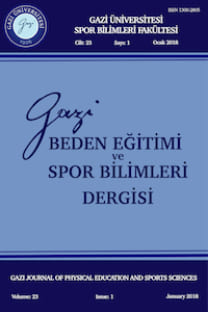BEDEN EĞİTİMİ ÖĞRETMENLERİNİN DERSLERDE SORU YÖNELTME ALIŞKANLIKLARININ İNCELENMESİ
Bu çalışmanın amacı beden eğitimi öğretmenlerinin derslerinde yönelttikleri soruları incelemektir. Çalışmada öğretmenlerin derslerinde öğrencilere yönelttikleri sorular miktar ve düzey olarak incelenirken, cinsiyet ve çalışılan okul tipinin (devlet yada özel) soru yöneltme davranışlarına olan etkileri de araştırılmıştır. Bu amaçla, 24 ilköğretim 2. kademe (6-8. sınışar) ve ortaöğretim düzeyinde eğitim veren öğretmen seçilmiştir. Her öğretmenin ikişer ders saati video kamera ile kaydedilmiştir. Ayrıca öğretmenlerin sesleri kablosuz bir mikrofonla kaydedilmiştir. Kayıtlar tamamen çözümlendikten sonra öğretmenler tarafından öğrencilere ders süresince yöneltilen sorular ayrılmıştır. Sorular Bloom’un "Eğitim Hedeşeri Sınışamasına" göre iki kişi tarafından ayrı ayrı olarak kodlanarak sınışandırılmıştır. Kodlama yapanlar arası güvenilirlik % 84 olarak tesbit edilmiştir. Bulgulara göre öğretmenler tarafından yöneltilen soruların % 64,2’si bilgi düzeyindedir. Kalan % 27,3’ü kavrama, % 7,7’si uygulama, % 0,8’i ise analiz düzeyinde yöneltilen sorular olarak tesbit edilmiştir. Sentez ve değerlendirme düzeyinde soru yöneltilmemiştir. Öğretmenlerin cinsiyetleri ve öğretmenlik yaptıkları okul tipinin yönelttikleri soru miktarında farklılığa neden olmadığı saptanmıştır (p > 0.05). Sonuç olarak beden eğitimi öğretmenlerinin özellikle öğrencilerin üst bilişsel becerilerini uyaran soru yöneltme davranışlarının geliştirilmesine ihtiyaç olduğu görülmüştür. Hizmetiçi eğitim programlarında soru yöneltme becerilerini geliştirecek uygulamalar yapılmalıdır.
Anahtar Kelimeler:
Beden eğitimi dersi, beden eğitimi öğretmeni, soru yöneltme becerisi
THE EVALUTION OF ASKING QUESTIONS HABITS IN LESSONS OF PHYSICAL EDUCATION TEACHER’S
The purpose of this study was to examine questioning behaviors of physical education teachers in teaching. In particular, specific questions addressed in this study were the amount and level of questioning in physical education classes, and the effects of gender of the teachers and the school type (public or private) on the amount of asked questions. For this purpose, 24 physical education teachers from elementary (6-8 grade level) and secondary schools were selected. Each teacher’s two class hours were videotaped. In addition, their voice were recorded by using cordless microphone. All recorded data were fully transcribed, and questions asked to students by teachers during the lessons were captured from the text. Questions were classified according to the Bloom’s Taxonomy of Educational Objectives. Two researchers independently coded the questions. Interobserver reliability was 84 percent. Findings indicated that 64,2 percent of all questions asked by the teachers were at the knowledge level. 27,3 percent, 7,7 percent, and 0,8 percent of the questions were at comprehension, application and analysis levels, respectively. None of the questions were either at the synthesis or at the evaluation levels. There were no significant differences in neither gender of teachers nor the worked school type on the amount of questions asked by the teachers (p > 0.05). In conclusion, there is a need to develop physical education teachers’ questioning skills in their teaching. Professional development programs for the physical education teachers should focus on this aspect of teaching.
Keywords:
physical education, teachers, questioning skills,
___
- 1. Butler, J. (1997). How Would Socrates Teach Games? A constructivist approach. JOPERD, 68(9), 42-47.
- 2. Bloom, B.S. (1956). Taxonomy of Educational Objectives Handbook One: Cognitive Domain. Longmans, London.
- 3. Savage, L.B. (1998). Eliciting Critical Thinking Skills Through Questioning. Clearing House, 71(5), 291-293.
- 4. Cotton, K. (1998). Classroom Questioning. School Improvement Research Series. Regional Educational Laboratory. http://www.nwrel.org/scpd/sirs/3/cu5.html adresinden 1.11.2004 tarihinde indirilmiştir.
- 5. Wimer, J.W., Ridenour, C.S., Thomas, K., Place, A.W. (2001). Higher Order Teacher Questioning of Boys and Girls in Elementary Mathematics Classrooms. The Journal of Educational Research, 95(2), 84-92.
- ISSN: 1300-2805
- Yayın Aralığı: Yılda 4 Sayı
- Başlangıç: 1996
- Yayıncı: Gazi Üniversitesi
Sayıdaki Diğer Makaleler
M. Yalçın TAŞMEKTEPLİGİL, İlkay AYDIN, Seydi Ahmet AĞAOĞLU, Nurullah ÖĞRETEN
BASKETBOLCULARDA ALGILANAN FİZİKSEL YETERLİK
Fatma ÇEPİKKURT, Şefik TİRYAKİ
FAİR PLAY: KAPSAMI, TÜRKİYE’DEKİ GÖRÜNÜMÜ VE GELİŞTİRME PERSPEKTİFLERİ
BEDEN EĞİTİMİ ÖĞRETMENLERİNİN DERSLERDE SORU YÖNELTME ALIŞKANLIKLARININ İNCELENMESİ
